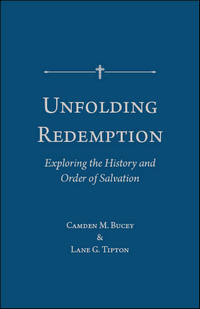 Unfolding Redemption:
Unfolding Redemption:
Exploring the History and Order of Salvation
by Camden M. Bucey & Lane G. Tipton
DETAILS: Publisher: Reformed Forum Publication Date: October, 2023 Format: Booklet Length: 52 pg. Read Date: November 5, 2023

Many well-meaning Christians view salvation in Christ exclusively through a personal and subjective lens. They perceive salvation as an intimate process of divine intervention, manifesting in transformative experiences, feelings, and changes in our lives. While salvation certainly includes a personal experience, the Bible teaches an objective and historical foundation for such salvation in the person and work of Jesus Christ. Accordingly, before we can speak meaningfully about our individual salvation experience, we must first understand that salvation, at its heart, is an accomplished reality. It is rooted in real, historical events that took place long before our personal experience of salvation. This accomplishment of salvation, carried out by God through Jesus Christ in the unfolding of covenant history, sets the stage for the personal application of salvation in our lives.
Essentially, before salvation can be applied to us subjectively, it must be accomplished objectively. It is this accomplished work of God, historically embodied in the life, death, and resurrection of Jesus Christ, that is the basis for the salvation we experience. Jesus Christ himself is the wellspring from which flows all the benefits of our salvation: justification, adoption, sanctification, and eventual glorification. To understand truly the richness and depth of our personal salvation experience, we must first grapple with the historical accomplishment of salvation—the foundation upon which our subjective experiences are built.
What’s Unfolding Redemption About?
This booklet is essentially an unpacking of that opening quotation. Following the Introduction which will introduce the thesis of the book, introduce and define some terms, and so on, the opening chapter examines the historic, objective work “historically embodied in the life, death, and resurrection of Jesus Christ,” what the authors (and many others) would summarize as the historia salutis.
The second chapter looks at the subjective application of that work to us and our lives—the ordo salutis.
The Significance of Pentecost
Rather than beginning with Genesis, the Prophets, or even the Gospel accounts to look at the historia salutis, Bucey and Tipton start at Pentecost—from this vantage point they can look back at Genesis-Malachi as well as the Gospels for a look at that work of Christ and how it was foretold/foreshadowed and what he accomplished in His life, death, resurrection and ascension—leading to the outpouring of the Spirit at Pentecost as part of what they term “the Irreversible Progress of Redemption.”
Union with Christ
As we’re united with (or in) Christ, those elements of the work He accomplished can be applied to our hearts and souls, our minds, and our lives. They’re applied through justification, adoption, sanctification, forensic and redemptive benefits, and finally through glorification.
The individual aspects here are all touched on with a degree of depth, but they’re very brief (the booklet itself is 52 pages long, everything is brief). But you don’t feel short-changed, which is pretty impressive for 1-4 page discussions.
So, what did I think about Unfolding Redemption?
Understanding what has transpired in Christ breathes life into our understanding of our individual spiritual journeys. Recognizing our faith within the progressive and organic climax of redemptive history in the person, work, and kingdom of Jesus Christ helps us understand our place within his grand design and enhances our communion with Christ. In this context, our salvation becomes not just a personal experience but part of history of special revelation that finds its center and substance—its goal and telos—in the crucified and glorified Son of God—the church’s “hope of glory” (Col. 1:27).
I really appreciate the emphasis on the two ways of looking at redemption—accomplishment and application. What was done on our behalf and how it changes us. It’s too often overlooked and/or confused by the American Church today, and we need to get it straightened out.
Overall, I liked Unfolding Redemption—I wasn’t blown away by it (partially, because I’ve read everything they point readers to for more depth), but it’s asking a lot for a booklet of this length to blow anyone away.
I did think that this is a handy thing to hand out to people who are new to Reformed soteriology—or who are curious about it, and can think of a handful of people I wish I had copies for right now. The whole point of this booklet is to be a starting point—one that points in a direction for further inquiry/study. And it does a great job of doing that.
On those terms, I feel like I’m short-changing it on stars. On the other hand, these are about my reactions–which were I liked it. So, I’m sticking with that. Although, I halfway expect those I had in mind to hand it to will react far more positively. Basically, your results may vary, and probably will.

![]()

